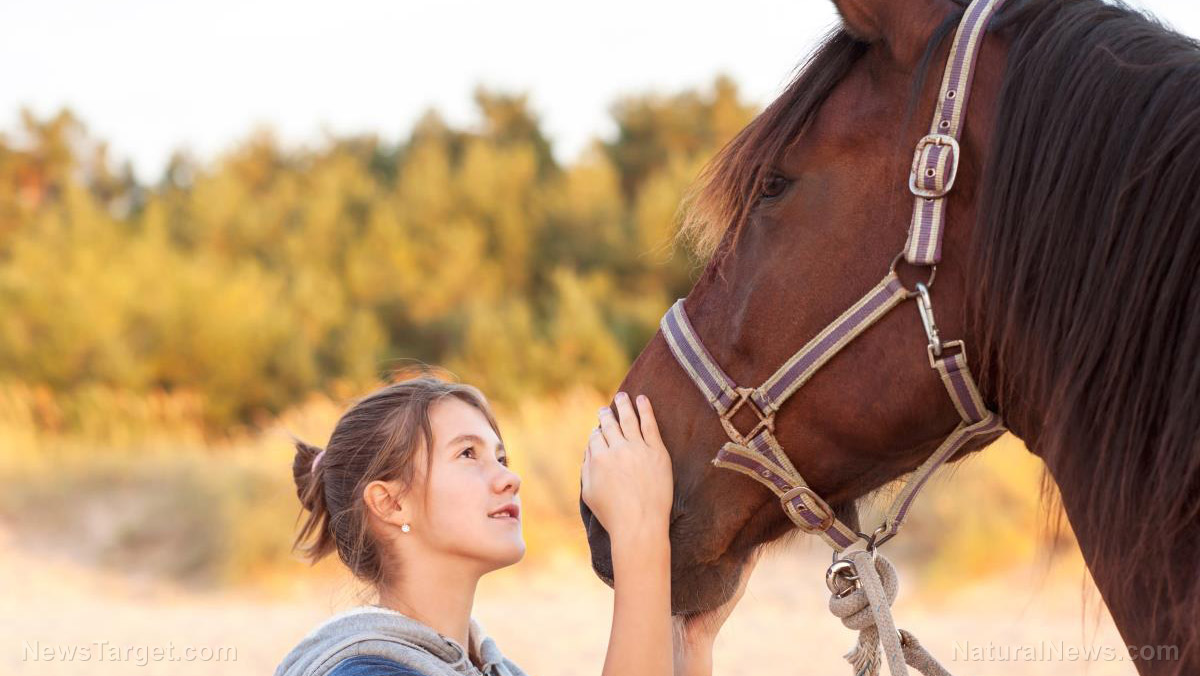Animal science: Horses remember people’s emotional expressions to identify a potential threat
09/14/2018 / By Zoey Sky

Like cats and dogs, horses are some of the most socially intelligent animals. According to a study, horses can even interpret human facial expressions to identify potential threats.
The study, which was published in the journal Current Biology and spearheaded by researchers from the University of Sussex and the University of Portsmouth, showed that “horses can read and then remember people’s emotional expressions, enabling them to use this information to identify people who could pose a potential threat.”
Entitled “Animals remember previous facial expressions that specific humans have exhibited”, the paper was written by a team of psychologists. The team of researchers was co-led by Professor Karen McComb from the University of Sussex and Dr. Leanne Proops from the University of Portsmouth. Professor McComb and Dr. Proops are both specialists in animal behavior.
The research team ran controlled experiments where domestic horses were shown a photograph of either an angry or happy human face. Several hours after the images were shown, the horses were then taken to see the actual person who exhibited the expression. However, when shown to the horses the person was “in an emotionally neutral state.”
Findings from the study determined that the short-term exposure to a photograph that captured a person’s facial expression was enough to allow the horse to produce a subsequent response when the animal met the same individual later in the same day.
Per the study’s results, even if the humans were in a neutral state during the live meeting, the direction of the horses’ gaze indicated that the animals saw a person in a negative light if they initially saw them looking angry in a photograph.
Earlier studies from the University of Sussex have confirmed that animals often see negative events with their left eye. This occurs because of “the right brain hemisphere’s specialization for processing threatening stimuli (information from the left eye is processed in the right hemisphere).”
For the current experiment, the individuals didn’t know which photographs were previously shown to the horses. This helped prevent the humans from behaving differently during the meeting and influencing the horses’ reactions. It’s worth noting that the horses only had different reactions when they finally met the people that they already saw in photographs.
Professor McComb said that based on the study, horses can read human facial expressions and remember the latter’s previous emotional state even if they meet later in the same day. She added that horses are able to adjust their behavior accordingly. In short, “horses have a memory for emotion.”
Dr. Proops noted that while it has already been proven that horses are socially intelligent animals, the study marks the first time that a mammal has displayed this particular ability. She continued that the feat was particularly impressive since the horses only saw the photographs briefly and that the horses didn’t share “a strongly positive or negative experience with the person.” (Related: Non-traditional therapy: How horses help heal veterans with PTSD.)
While other studies, even those conducted by the University of Sussex, have revealed that horses are able to recognize human facial expressions, this study was the first to confirm that horses can also recall emotional experiences with certain people.
The researchers believe that this discovery can be applied during social bonding and aggression avoidance, especially if horses encounter certain individuals once more.
Fast facts on horses
- Horses can express their mood using their ears, eyes, and nostrils. They are also able to communicate their feelings via facial expressions.
- It is rare to see a team of horses lying down all at the same time. Experts believe that there is always a look-out horse so the others can be alerted immediately if there are signs of any potential dangers.
- Horses and other equines have a better sense of smell and sense of hearing than people. They can even turn their ears in different directions to hear better.
- Horses have almost 360-degree vision, although they have blind spots directly in front of and behind them. This means it’s not a good idea to stand behind a horse since they might kick out if they are frightened. Horses kick out to defend themselves.
Read more interesting articles about animal science at WeirdScienceNews.com.
Sources include:
Tagged Under: animal behavior, animal memory, animal science, domestic horses, emotional experiences, emotional expressions, facial expressions, horses, human expressions, memory, potential threats, research, threats, weird science




















